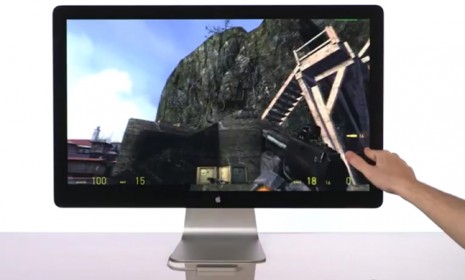Leap: Control your computer with Minority Report-style gestures
The exciting new motion sensor plugs right into your USB port, and seamlessly picks up on hand swipes and finger flicks

A free daily email with the biggest news stories of the day – and the best features from TheWeek.com
You are now subscribed
Your newsletter sign-up was successful
A small device by a start-up company called Leap Motion lets users control their computers using 3D air gestures, meaning the stylish finger flicks and arm waves associated with the futuristic computers in Minority Report and The Avengers are coming soon to a device near you. Here's what you should know about the cool new tech that has the blogosphere hyped:
What is it?
The Leap is a small Lego-sized motion sensor you can plug into your computer's USB. The technology behind it is similar to Microsoft's Kinect, which reads a user's arm and leg movements to control onscreen action. Leap goes even further because it "can sense motion down to the most subtle movements of a finger," which, according to the company, makes the device "200 times more sensitive than anything else on the market," says Daniel Terdiman at CNET.
The Week
Escape your echo chamber. Get the facts behind the news, plus analysis from multiple perspectives.

Sign up for The Week's Free Newsletters
From our morning news briefing to a weekly Good News Newsletter, get the best of The Week delivered directly to your inbox.
From our morning news briefing to a weekly Good News Newsletter, get the best of The Week delivered directly to your inbox.
How do you use it?
Once the sensor is plugged in and the software is installed, the Leap transforms the 8-cubic feet of air in front of the computer into a "3D interaction space," says Peter Pachal at Mashable. Basically, "it'll track any and all motion within that space, letting you use your hands to do whatever you could do with a mouse."
What can it do?
You can use it to swipe through menus, pinch-to-zoom, or even rotate onscreen objects. (Watch a demo below.) Users can even wield things like pens for added precision. "It really makes you feel connected," Leap Motion's chief technology officer David Holz tells The Wall Street Journal. By contrast, tools like the mouse or the trackpad "don't work like real life."
A free daily email with the biggest news stories of the day – and the best features from TheWeek.com
How much will it cost?
The Leap will be priced at an affordable $69.99, and is set to ship this winter.
Take a look:
Sources: CNET, Mashable, Wall Street Journal
-
 How the FCC’s ‘equal time’ rule works
How the FCC’s ‘equal time’ rule worksIn the Spotlight The law is at the heart of the Colbert-CBS conflict
-
 What is the endgame in the DHS shutdown?
What is the endgame in the DHS shutdown?Today’s Big Question Democrats want to rein in ICE’s immigration crackdown
-
 ‘Poor time management isn’t just an inconvenience’
‘Poor time management isn’t just an inconvenience’Instant Opinion Opinion, comment and editorials of the day